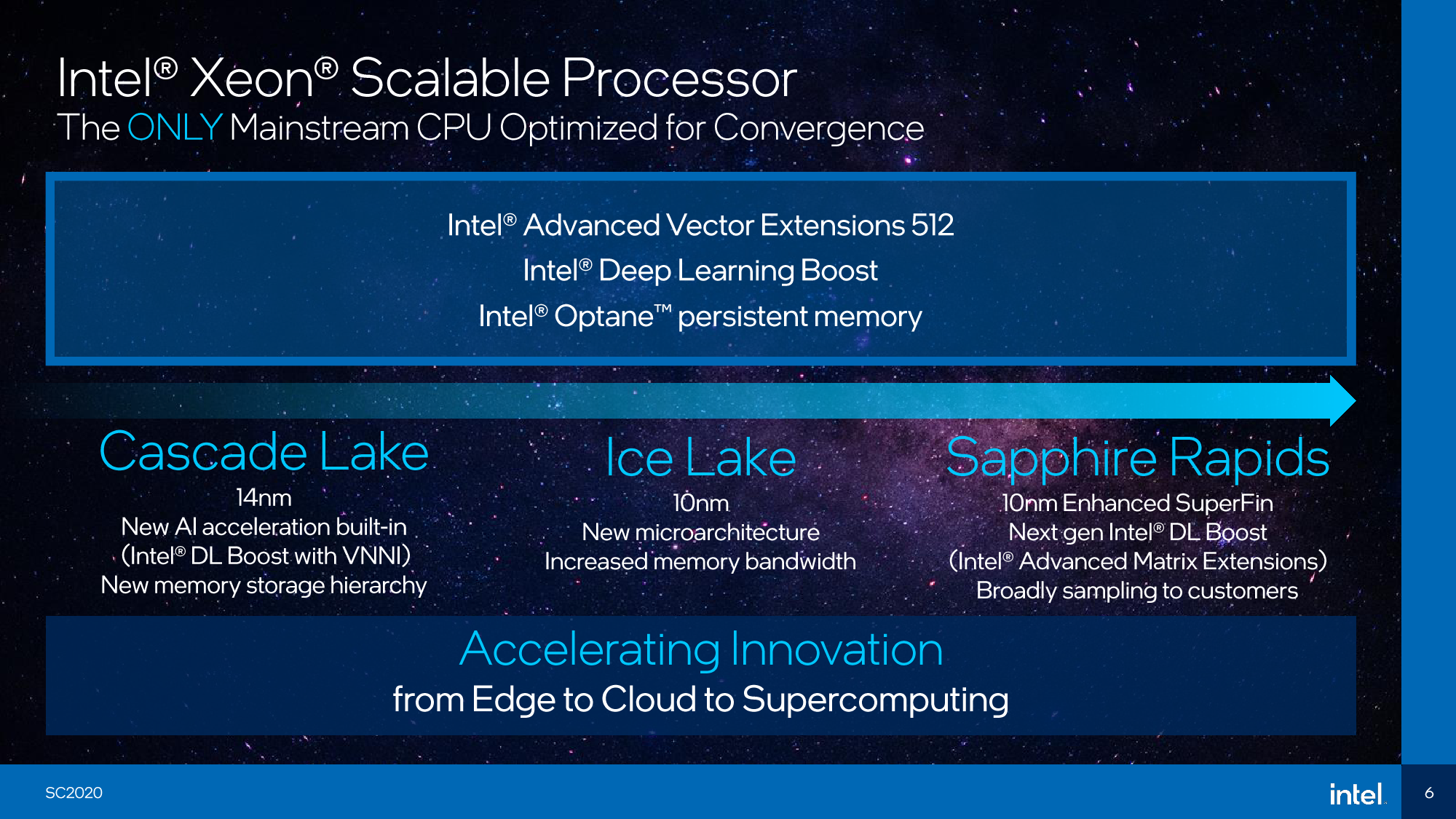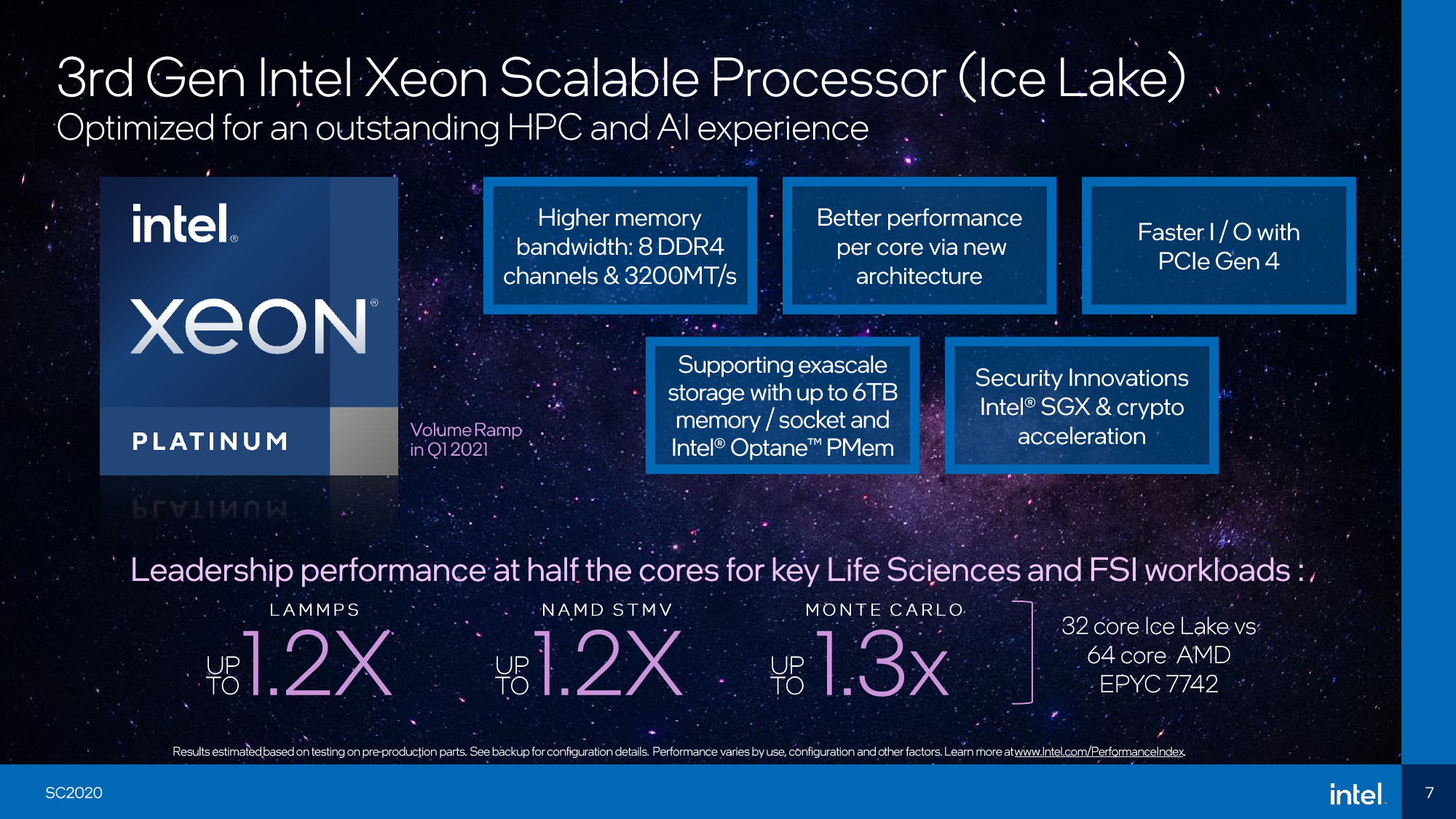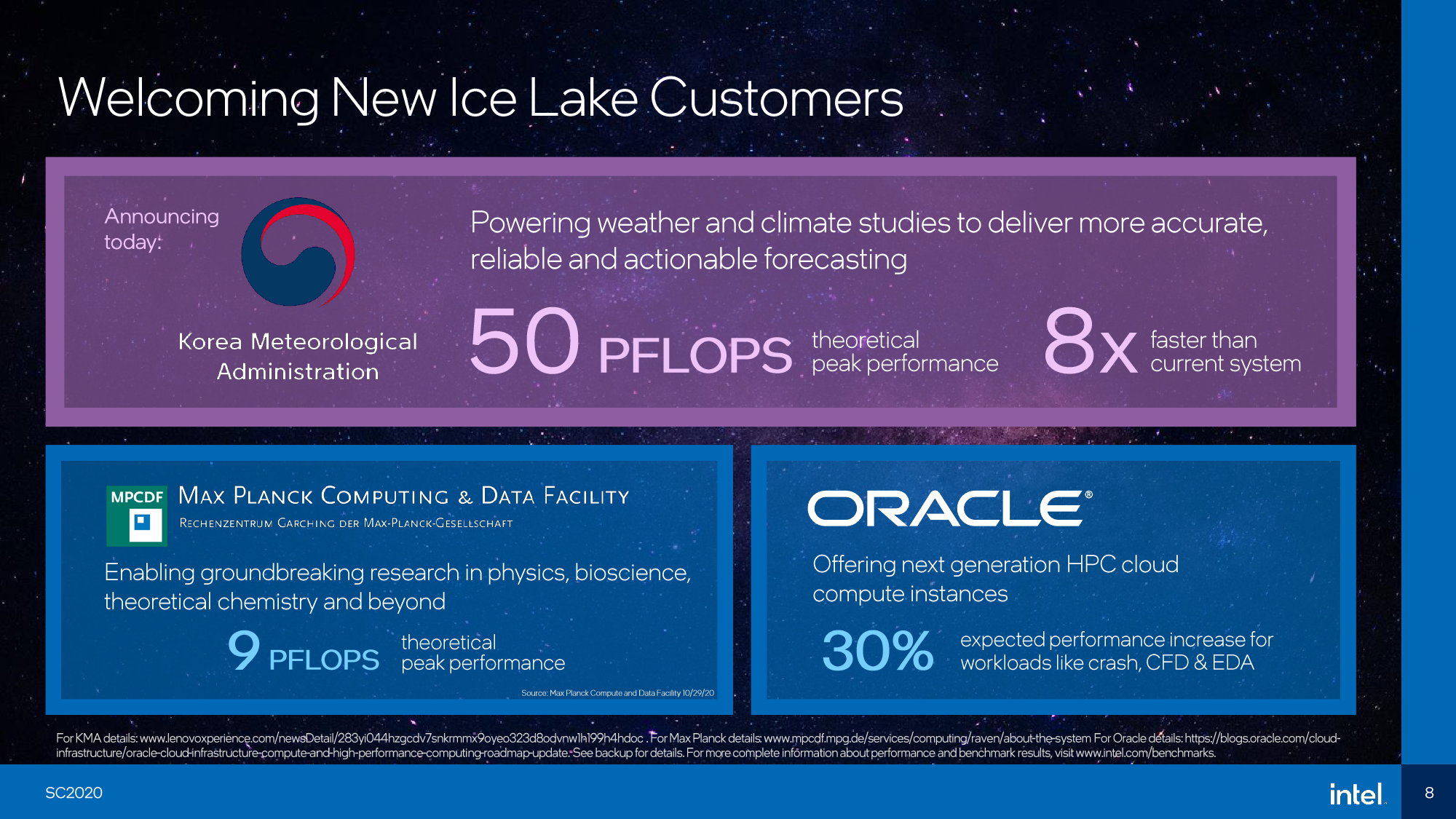Intel Reveals More Ice Lake-SP Details: Claims 32-Core Ice Lake Is Faster Than 64-Core AMD EPYC
Intel unveils first 3rd Generation Xeon Scalable 'Ice Lake-SP' CPU performance numbers
At the Supercomputing 2020 trade show, Intel revealed some additional details about its upcoming 3rd Generation Xeon Scalable 'Ice Lake-SP' processors due to be formally launched in Q1 2020. Among other things, Intel shared some preliminary performance numbers and said that a server running two 32-core Ice Lake CPUs is faster than a machine based on two of AMD's 64-core EPYC processors.
In addition to disclosing some performance figures of Ice Lake-SP processors, Intel also confirmed that it is broadly sampling its next-generation code-named Sapphire Rapids CPUs that are made using its 10nm Enhanced SuperFin process technology.
Intel's upcoming 3rd Generation Xeon Scalable processor will feature up to 32 cores as well as eight memory channels that will support up to 6TB of DDR4-3200 memory/Intel Optane persistent memory. In addition, the new processor will support PCIe 4.0 connectivity as well as a number of new security technologies, including crypto accelerators.
Intel says the new Sunny Cove microarchitecture coupled with special-purpose accelerators and extended memory support will allow the new processors to be significantly faster than predecessors which rely on the rather outdated Skylake microarchitecture. The new CPUs are made using Intel's second-gen 10 nm process technology that is also used for client Ice Lake products.
According to Intel, a server running two third-gen 32-core Xeon Scalable 'Ice Lake' CPUs clocked at 2.20 GHz and paired with 256 GB of DDR4-3400 memory is 20% ~ 30% faster in select benchmarks (LAMMPS, NAMD STMV, Monte Carlo) when compared to a server powered by two 64-core AMD EPYC 7742 processors clocked at 2.25 GHz and equipped with 256 GB of DDR4-3200. That's despite the fact that Intel's system has half the number of cores.
Intel yet has to formally introduce its 3rd Generation Xeon Scalable 'Ice Lake' processors, but a number of its customers, including Korea Meteorological Administration, The Max Planck Computing and Data Facility, The National Institute of Advanced Industrial Science and Technology (AIST), The University of Tokyo, Osaka University, and Oracle have already announced plans to deploy the new CPUs for their HPC needs.
In addition to disclosing some performance figures of Ice Lake-SP processors, Intel also confirmed that it is broadly sampling its next-generation code-named Sapphire Rapids CPUs that are made using its 10nm Enhanced SuperFin process technology.
Get Tom's Hardware's best news and in-depth reviews, straight to your inbox.

Anton Shilov is a contributing writer at Tom’s Hardware. Over the past couple of decades, he has covered everything from CPUs and GPUs to supercomputers and from modern process technologies and latest fab tools to high-tech industry trends.
-
steve15180 You forgot to mention the fine print.....those programs are heavy with AVX512 workloads. Anything else and Ice Lake gets obliterated.Reply -
jeremyj_83 Reply
Not to mention they are comparing against the 2019 CPU. Gen 3 Epyc is already shipping to cloud providers. Servethehome did a good write up about this release from Intel.steve15180 said:You forgot to mention the fine print.....those programs are heavy with AVX512 workloads. Anything else and Ice Lake gets obliterated. -
Kamen Rider Blade I wish Intel would leave AVX512 for their GPU accelerators and just stop trying to shove it into every CPU.Reply
Unless you want every CPU manufacturer to double the decoder width of their CPU just to accomodate AVX152, I don't think it's worth it. -
escksu Replysteve15180 said:You forgot to mention the fine print.....those programs are heavy with AVX512 workloads. Anything else and Ice Lake gets obliterated.
Oh ok..... No doubt Intel has a big lead in AVX512. -
escksu Replyjeremyj_83 said:Not to mention they are comparing against the 2019 CPU. Gen 3 Epyc is already shipping to cloud providers. Servethehome did a good write up about this release from Intel.
Intel will still be faster on AVX512. But AVX512 is a very specific scenario and very few apps need AVX512. -
jeremyj_83 Reply
Yes in AVX512 the Ice Lake chip will be faster, but not by as much. However, what I was getting at is Intel was comparing their upcoming chip (not shipping at all until Q1 2021) to previous generation Epyc. Had Epyc not been shipping to people like cloud providers then the comparison would have been more valid. However, there is always the possibility that Intel couldn't get their hands on a Gen 3 Epyc.escksu said:Intel will still be faster on AVX512. But AVX512 is a very specific scenario and very few apps need AVX512. -
jimmysmitty Replysteve15180 said:You forgot to mention the fine print.....those programs are heavy with AVX512 workloads. Anything else and Ice Lake gets obliterated.
AVX512 or not it will matter for the markets this is used.
I do wonder how well AMD has been at rebuilding their relationships with HPC clients. I also hope they have the process capacity to fill orders if they start getting big in that market again. -
bigdragon I just about spit out my coffee upon reading that headline. A 32-core CPU beating a 64-core CPU in real world use? Lol, nope. How stupid does Intel think people are? Those sort of claims make Intel look desperate and deceitful. I don't care about your idealized benchmarks and cherry-picked usage scenario -- connect to my database and serve some customers faster.Reply -
jimmysmitty Replybigdragon said:I just about spit out my coffee upon reading that headline. A 32-core CPU beating a 64-core CPU in real world use? Lol, nope. How stupid does Intel think people are? Those sort of claims make Intel look desperate and deceitful. I don't care about your idealized benchmarks and cherry-picked usage scenario -- connect to my database and serve some customers faster.
Its very possible depending on the actual use case. Some applications benefit heavily from AVX instructions which Intel is vastly ahead of AMD in that respect. Now in an application that doesn't and relies n raw core count and power? Probably not.


